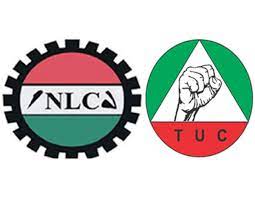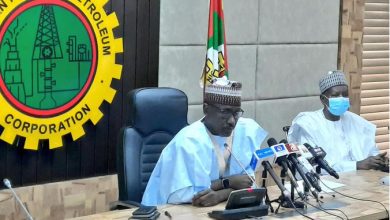Subsidy Removal Protest: Nigerian govt files contempt suit against labour leaders
The move, launched at the National Industrial Court in Abuja, seeks to have the labour leaders jailed for their alleged disobedience to the court's order.

The federal government has commenced a contempt suit against the leaders of the Nigeria Labour Congress (NLC) and Trade Union Congress (TUC) over Wednesday’s protest against fuel subsidy removal.
The move, launched at the National Industrial Court in Abuja, seeks to have the labour leaders jailed for their alleged act of disobedience to the court’s order.
The organised labour, on Wednesday, staged a nationwide protest to compel the government to either restore fuel subsidy or ameliorate the hardship occasioned by the policy shift, angering the government which had in June obtained a court order to thwart a nationwide strike by the labour unions.
The protest, most remarkable in Lagos and Abuja on Wednesday, was in defiance to an earlier warning of the justice ministry, which had said the demonstration would amount to a disobedience to a 5 June court order barring the union from embarking on strike.
The government, through the Federal Ministry of Justice, had sternly warned in a statement on 26 July that the planned strike by the union would be a contempt of court, an offence that is punishable by jailing.
It stated on Wednesday that the order issued by the National Industrial Court in Abuja on 5 June had stopped, not just strikes, but also any form of industrial action organised to oppose the removal of fuel subsidy.
Following Wednesday’s protest by the labour unions, the justice ministry approached the industrial court to commence a contempt suit against the labour leaders.
The ministry filed a notice of consequences of disobedience to order of court, also referred to as Form 48, the first of the two stages of a contempt suit.
The notice was addressed to the NLC President, Joe Ajaero; Deputy Presidents Audu Aruba, Adeyanju Adewale, and Kabiru Sani; General Secretary, Emmanuel Ugboaja; TUC President, Festus Usifo, and Scribe/Chief Executive, Nuhu Toro.
Take notice that unless you obey the directions contained in the order of the National Industrial Court, Abuja, delivered by Honourable Justice Y. Anuwe on 5 June 2023, as per the attached enrolled order, you will be guilty of contempt of court and will be liable to be committed to prison,” the contempt notice signed by Senior Registrar.
A copy of the earlier restraining order was attached to the Form 48.
After the service of Form 48 on the alleged “contemnors”, they will be required to immediately comply with the court order they are accused of violating.
If they fail to comply with the court order, the case will proceed to the next stage which is the service of Form 49, notice to show cause why an order of committal should not be issued, on the alleged contemnors.
It is at this stage a trial will be conducted to enable the court to determine if the alleged contemnors have truly violated the referenced court order.
If the court finds them guilty, it will send them to prison for a period which can range from weeks to months.
The federal government and the labour union are locked in a dispute over fuel subsidy removal, which President Bola Tinubu announced at his inauguration on 29 May.
The organised labour, since the declaration, had urged the government to rescind its decision, citing the economic hardship it would plunge workers into.
They subsequently threatened to begin a nationwide strike to pressure the governent to backtrack on the policy shift.
To stop the strike, the government rushed to court, praying for an order halting the planned strike, citing the socio-economic impact it would have.
The judge, Olufunke Anuwe, on 5 June, restrained the NLC and the TUC from embarking on the planned strike action, which they had planned to begin on 7 June.
The respondents are hereby restrained from embarking on any strike action of any nature pending the determination of the motion on notice dated 5 June,” the judge had ordered.
The unions later shelved the planned strike to continue negotiations with the government.
But the talks have not yielded any positive results as union leaders continue to push for a reversal of the decision.
The NLC recently renewed its threat to embark on strike, after a second hike in petrol pump price in the aftermath of the subsidy removal.
In reaction, the justice ministry, on 26 July, warned the labour unions to desist from going ahead with the planned strike as it would amount to contempt of court.
Justice, Beatrice Jedy-Agba, had state, it is, therefore, our minimum expectation that NLC will allow the courts perform their constitutional roles rather than resorting to self-help and undermining the orders of the court,” the Solicitor-General of the Federation and Permanent Secretary, Federal Ministry.
Mrs Jedy-Agba re-echoed the warning in a letter to NLC’s lawyer, Femi Falana, on Tuesday.
She had said in her letter that the planned action of the union, whether in form of a strike or protests, would be in be in violation of a court order in as much as it was about fuel subsidy removal.
The NLC through its lawyer, Mr Falana, a Senior Advocate of Nigeria, said his clients were planning a peaceful protest and not strike. He said there was no court order barring protests by Nigerians.
Mr Falana, in his letter dated 28 July, and addressed to Mrs Jeddy-Agba, referenced a judicial authority affirming the right of Nigerians to protest without the need to obtain a police permit.
In defiance to Mrs Jedy-Agba’s warning, workers trooped to the streets and held demonstrations at key government offices in Lagos and Abuja to oppose the subsidy removal policy on Wednesday.
Mr Falana joined the protest in Lagos where he addressed a crowd of protesters and the Lagos State deputy governor, Obafemi Hamzat, who received them on behalf of the state government.
Apart from the reversal of the subsidy removal, the protesting workers are demanding an upward review of salaries and functional public transport system in major cities across the country.
They also called on government to fight corruption and cut down on the cost of governance.






